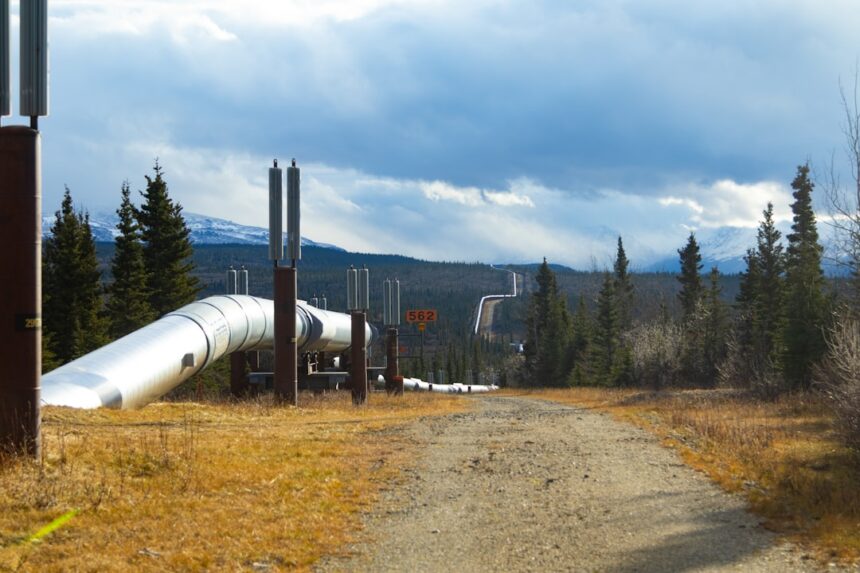Pipeline attacks have emerged as a significant concern in the realm of energy security, particularly in the context of oil and gas transportation. These attacks can take various forms, including cyber intrusions, physical sabotage, and even terrorism, all of which pose a threat to the integrity and reliability of critical energy infrastructure. As the world becomes increasingly dependent on fossil fuels, the vulnerability of pipelines to such attacks has garnered heightened attention from governments, corporations, and the public alike.
The ramifications of these incidents extend beyond immediate disruptions; they can lead to economic instability, environmental degradation, and geopolitical tensions. The rise of pipeline attacks is not merely a reflection of technological advancements that facilitate such actions but also a manifestation of broader socio-political dynamics. As nations grapple with energy demands and security concerns, the stakes associated with pipeline integrity have escalated.
Understanding the multifaceted nature of pipeline attacks is essential for grasping their implications on global energy markets and national security. This article will explore the historical context, economic impacts, environmental consequences, and the political ramifications of pipeline attacks, as well as consumer behavior and strategies for mitigation.
Key Takeaways
- Pipeline attacks are a serious threat to the stability of gas prices and can have far-reaching consequences.
- Historical context shows that pipeline attacks have been used as a tactic in conflicts and have had significant economic and environmental impacts.
- Pipeline attacks can lead to increased gas prices, affecting consumers and the overall economy.
- Environmental impact of pipeline attacks can result in oil spills and damage to ecosystems.
- Pipeline attacks can have political and geopolitical ramifications, leading to tensions between countries and affecting international relations.
Historical Context of Pipeline Attacks
The history of pipeline attacks can be traced back several decades, with notable incidents occurring during periods of geopolitical strife. In the 1970s, for instance, the oil crisis highlighted vulnerabilities in energy supply chains, leading to increased awareness of the potential for sabotage. However, it was not until the late 20th century that pipeline attacks began to gain prominence as a tactic employed by various groups seeking to achieve political or ideological objectives.
The rise of non-state actors and terrorist organizations has further complicated the landscape, as these groups often target energy infrastructure to disrupt economies and draw attention to their causes. In more recent years, the advent of cyber warfare has introduced a new dimension to pipeline security concerns. High-profile cyberattacks, such as the 2021 Colonial Pipeline incident in the United States, underscored the susceptibility of critical infrastructure to digital threats.
This attack not only disrupted fuel supplies across the East Coast but also highlighted the interconnectedness of modern energy systems and the potential for cascading failures. As technology continues to evolve, so too do the methods employed by those seeking to exploit vulnerabilities in pipeline systems.
Economic Impact of Pipeline Attacks on Gas Prices

The economic ramifications of pipeline attacks are profound, particularly concerning gas prices. When a pipeline is compromised, it can lead to immediate supply shortages, causing prices to spike as demand outstrips available supply. This phenomenon was evident during the Colonial Pipeline attack when gas prices surged in response to fears of prolonged disruptions.
Such price volatility can have cascading effects on various sectors of the economy, from transportation to manufacturing, ultimately impacting consumers at the pump. Moreover, pipeline attacks can create a climate of uncertainty in energy markets. Investors may react to perceived risks by pulling back on investments in energy infrastructure or seeking alternative sources of supply.
This hesitance can lead to long-term price increases as companies adjust their strategies to mitigate risks associated with potential future attacks. The economic impact extends beyond immediate price fluctuations; it can also influence national energy policies and international relations as countries seek to secure their energy supplies against potential threats.
Environmental Impact of Pipeline Attacks
| Year | Number of Pipeline Attacks | Volume of Oil Spilled (barrels) | Volume of Natural Gas Released (cubic feet) |
|---|---|---|---|
| 2016 | 82 | 176,000 | 12,000,000 |
| 2017 | 76 | 198,000 | 10,500,000 |
| 2018 | 94 | 215,000 | 14,000,000 |
| 2019 | 103 | 240,000 | 15,500,000 |
| 2020 | 89 | 192,000 | 13,000,000 |
The environmental consequences of pipeline attacks are often overlooked in discussions about economic impacts and gas prices. When pipelines are damaged or sabotaged, they can leak hazardous materials into surrounding ecosystems, leading to soil and water contamination. Such incidents can have devastating effects on local wildlife and plant life, disrupting delicate ecological balances and potentially leading to long-term environmental degradation.
In addition to direct environmental harm, pipeline attacks can also hinder efforts to transition to cleaner energy sources. As governments and organizations strive to reduce carbon emissions and promote sustainability, incidents that compromise fossil fuel infrastructure can divert attention and resources away from renewable energy initiatives. The focus on securing existing pipelines may lead to delays in adopting cleaner technologies, ultimately prolonging reliance on fossil fuels and exacerbating environmental challenges.
Political and Geopolitical Ramifications of Pipeline Attacks
Pipeline attacks often carry significant political and geopolitical implications that extend far beyond immediate economic concerns.
This vulnerability can lead to heightened tensions between countries, particularly if one nation perceives another as responsible for or complicit in such attacks.
Furthermore, pipeline attacks can serve as catalysts for broader geopolitical conflicts. For instance, disputes over energy resources have historically fueled tensions between nations, with pipeline routes often becoming focal points for territorial disputes or military engagements. As countries vie for control over energy supplies and transportation routes, the potential for conflict increases, underscoring the importance of securing pipelines not only for economic reasons but also for maintaining regional stability.
Consumer Behavior in Response to Gas Price Increases

When gas prices rise due to pipeline attacks or other disruptions, consumer behavior often shifts in response. Many individuals may alter their driving habits, opting for public transportation or carpooling to mitigate rising fuel costs. This change in behavior can lead to decreased demand for gasoline in the short term; however, it may also prompt consumers to seek alternative energy sources or more fuel-efficient vehicles in the long run.
Additionally, consumer sentiment plays a crucial role in shaping market dynamics during periods of price volatility. As consumers become more aware of the factors influencing gas prices, they may express their concerns through advocacy for policy changes or support for renewable energy initiatives. This shift in consumer behavior can create pressure on governments and corporations to prioritize energy security and sustainability in their decision-making processes.
Strategies for Mitigating the Impact of Pipeline Attacks on Gas Prices
To address the challenges posed by pipeline attacks and their impact on gas prices, various strategies can be employed at both national and corporate levels. One approach involves investing in advanced security measures for pipeline infrastructure, including enhanced surveillance systems and cybersecurity protocols. By fortifying pipelines against potential threats, companies can reduce the likelihood of disruptions that lead to price spikes.
Another strategy involves diversifying energy sources and supply routes. By reducing dependence on a single pipeline or region for energy supplies, countries can mitigate the risks associated with potential attacks. This diversification can take many forms, including investing in renewable energy projects or establishing partnerships with alternative suppliers.
Such measures not only enhance energy security but also contribute to long-term sustainability goals.
Long-Term Consequences of Pipeline Attacks on Gas Prices
The long-term consequences of pipeline attacks on gas prices are complex and multifaceted.
Increased investment in security measures may lead to higher operational costs for energy companies, which could be passed on to consumers in the form of elevated prices.
Moreover, repeated incidents may foster a culture of risk aversion within the energy sector. Companies may become hesitant to invest in new projects or expand existing infrastructure due to fears of potential attacks. This reluctance can stifle innovation and hinder efforts to transition toward cleaner energy sources, ultimately perpetuating reliance on fossil fuels and contributing to ongoing environmental challenges.
International Cooperation in Preventing Pipeline Attacks
Given the global nature of energy markets and the interconnectedness of supply chains, international cooperation is essential in preventing pipeline attacks. Countries must work together to share intelligence regarding potential threats and collaborate on security measures that protect critical infrastructure. Joint exercises and training programs can enhance preparedness among nations facing similar risks.
Furthermore, international agreements aimed at securing energy infrastructure can foster collaboration among nations while promoting best practices in pipeline security. By establishing frameworks for cooperation, countries can collectively address vulnerabilities and enhance resilience against potential attacks.
Technological Advances in Pipeline Security
Technological advancements play a crucial role in enhancing pipeline security and mitigating the risks associated with attacks. Innovations such as real-time monitoring systems equipped with artificial intelligence can detect anomalies in pipeline operations that may indicate potential threats. These systems enable rapid responses to incidents before they escalate into significant disruptions.
Additionally, advancements in cybersecurity are vital for protecting digital infrastructure associated with pipeline operations. As cyberattacks become increasingly sophisticated, companies must invest in robust cybersecurity measures that safeguard against potential breaches. By leveraging technology effectively, energy companies can bolster their defenses against both physical and digital threats.
The Future of Gas Prices in the Face of Pipeline Attacks
The future of gas prices remains uncertain in light of ongoing threats posed by pipeline attacks. As geopolitical tensions rise and technological vulnerabilities persist, fluctuations in gas prices are likely to continue as a reflection of these challenges. However, proactive measures aimed at enhancing security and diversifying energy sources can help mitigate some of these impacts.
Ultimately, addressing the complexities surrounding pipeline attacks requires a multifaceted approach that encompasses economic strategies, environmental considerations, political cooperation, and technological advancements. By fostering resilience within energy systems and promoting sustainable practices, stakeholders can work toward a future where gas prices are less susceptible to disruption while ensuring a secure energy landscape for generations to come.
Pipeline attacks can have a significant impact on gas prices, as they disrupt the supply chain and create uncertainty in the market. When a pipeline is attacked, it can lead to a temporary halt in the transportation of gas, causing supply shortages and driving up prices. This issue is further explored in an article on




